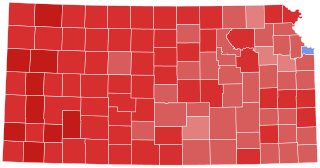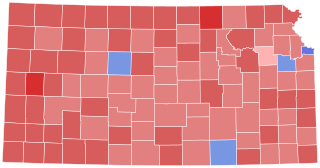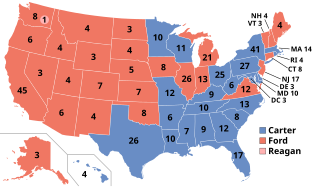
The 1996 United States presidential election was the 53rd quadrennial presidential election, held on Tuesday, November 5, 1996. Incumbent Democratic President Bill Clinton defeated former Senate Majority Leader Bob Dole, the Republican nominee, and Ross Perot, the Reform Party nominee and 1992 Independent presidential candidate.

Robert Joseph Dole was an American politician and attorney from Kansas who served in both chambers of the United States Congress, the U.S. House of Representatives in the 1960s and the United States Senate from 1969 to his resignation in 1996 to campaign for President of the United States. He was the Republican Leader of the Senate during the final 11 years of his tenure, including three non-consecutive years as Senate Majority Leader. Prior to his 27 years in the U.S. Senate, he served in the United States House of Representatives from 1961 to 1969. Dole was also the Republican presidential nominee in the 1996 election and the vice presidential nominee in the 1976 election.
The Democratic Senatorial Campaign Committee (DSCC) is the Democratic Hill committee for the United States Senate. Its purpose is to elect Democrats to the United States Senate. The DSCC's current Chair is Senator Gary Peters of Michigan, who succeeded Nevada's Catherine Cortez Masto after the 2020 Senate elections. DSCC's current executive director is Christie Roberts.

The 1998 United States Senate elections were held on November 3, with the 34 seats of Class 3 contested in regular elections. This was seen as an even contest between the Republican Party and Democratic Party. While the Democrats had to defend more seats up for election, Republican attacks on the morality of President Bill Clinton failed to connect with voters and anticipated Republican gains did not materialize. The Republicans picked up open seats in Ohio and Kentucky and narrowly defeated Democratic incumbent Carol Moseley Braun, but these were cancelled out by the Democrats' gain of an open seat in Indiana and defeats of Republican Senators Al D'Amato and Lauch Faircloth. The balance of the Senate remained unchanged at 55–45 in favor of the Republicans.

The 1996 United States Senate elections were held on November 5, with the 33 seats of Class 2 contested in regular elections. Special elections were also held to fill vacancies. They coincided with the presidential election of the same year, in which Democrat Bill Clinton was re-elected president.

The 1992 United States Senate elections, held November 3, 1992, were elections for the United States Senate. The 34 seats of Class 3 were contested in regular elections, along with special elections to fill vacancies. They coincided with Bill Clinton's victory in the presidential election. This was the first time since 1956 that the balance of the Senate remained the same.

The 1986 United States Senate elections were elections for the United States Senate. Held on November 4, in the middle of Ronald Reagan's second presidential term, the 34 seats of Class 3 were contested in regular elections. The Republicans had to defend an unusually large number of freshman Senate incumbents who had been elected on President Ronald Reagan's coattails in 1980. Democrats won a net of eight seats, defeating seven freshman incumbents, picking up two Republican-held open seats, and regaining control of the Senate for the first time since January 1981. This remains the most recent midterm election cycle in which the sitting president's party suffered net losses while still flipping a Senate seat.

The 1978 United States Senate elections were held on November 7, in the middle of Democratic President Jimmy Carter's term. The 33 seats of Class 2 were contested in regular elections. Special elections were also held to fill vacancies.

The 1974 United States Senate elections were held on November 5, with the 34 seats of Class 3 contested in regular elections. They occurred in the wake of the Watergate scandal, Richard M. Nixon's resignation from the presidency, and Gerald Ford's subsequent pardon of Nixon. Economic issues, specifically inflation and stagnation, were also a factor that contributed to Republican losses. As an immediate result of the November 1974 elections, Democrats made a net gain of three seats from the Republicans, as they defeated Republican incumbents in Colorado and Kentucky and picked up open seats in Florida and Vermont, while Republicans won the open seat in Nevada. Following the elections, at the beginning of the 94th U.S. Congress, the Democratic caucus controlled 60 seats, and the Republican caucus controlled 38 seats.

The Kansas Republican Party is the state affiliate political party in Kansas of the United States Republican Party. The Kansas Republican Party was organized in May 1859.

The 1998 United States Senate election in Kansas was held November 3, 1998. Incumbent Republican U.S. Senator Sam Brownback won re-election to his first full term. Brownback was first elected in a special election held in 1996, when then-Senator Bob Dole resigned to campaign for U.S. President, after 27 years in the Senate.

The 1996 United States elections were held on November 5 1996. Democratic President Bill Clinton won re-election, while the Republicans maintained their majorities in both houses of the United States Congress.

The 1996 United States Senate special election in Kansas was held November 5, 1996, concurrently with the presidential election and the regularly scheduled election for the state's Class 2 seat. Incumbent Republican U.S. Senator and Senate Majority Leader Bob Dole, the Republican nominee for president, had resigned on June 11, 1996, in order to focus on his presidential campaign. Lieutenant Governor Sheila Frahm was appointed to the seat upon Dole's resignation, but she was defeated in the primary by Representative Sam Brownback, who went on to win the general election over Democrat Jill Docking.

The 1976 United States elections were held on November 2, and elected the members of the 95th United States Congress. The Democratic Party won the presidential election and retained control of Congress.

The 1988 United States elections were held on November 8 and elected the President of the United States and members of the 101st United States Congress. Republican Vice President George H. W. Bush defeated Democratic Governor of Massachusetts Michael Dukakis. Despite Dukakis' defeat, the Democratic Party built on their majorities in Congress.

The 1968 United States Senate election in Kansas took place on November 5, 1968, concurrently with the U.S. presidential election as well as other elections to the United States Senate in other states as well as elections to the United States House of Representatives and various state and local elections.

The 1974 United States Senate election in Kansas took place on November 5, 1974. Incumbent Republican U.S. Senator Bob Dole was narrowly re-elected to a second term in office.

The 1978 United States Senate election in Kansas took place on November 7, 1978. Incumbent Republican Senator James B. Pearson did not run for re-election to a third full term.

The 1980 United States Senate election in Kansas took place on November 4, 1980. Incumbent Republican U.S. Senator Bob Dole was re-elected to his third term in office, after briefly campaigning for President earlier that year. He defeated Democrat John Simpson, who had previously served in the Kansas State Senate as a Republican.

The 1986 United States Senate election in Kansas was held on November 4, 1986. Incumbent Republican Bob Dole defeated Democratic nominee Guy MacDonald with 70.05% of the vote.





















